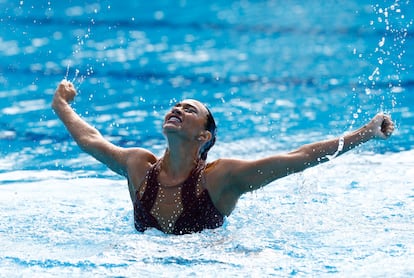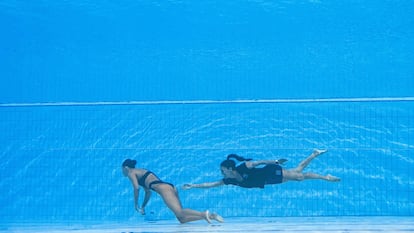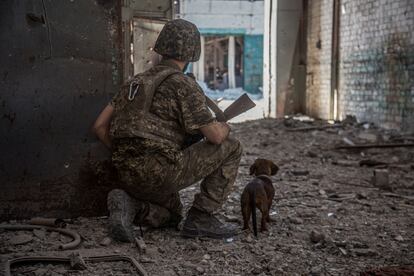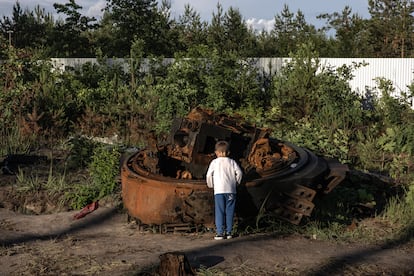Anita Álvarez, the swimmer who fainted in the pool: ‘I felt everything turn black’
The American athlete was hoping to participate in the women’s team final on Friday, but the International Swimming Federation has decided against it. Álvarez talked to EL PAÍS ahead of that decision, to explain how ‘demanding’ artistic swimming is, and why such incidents are common

“It’s been a long year,” says Anita Álvarez, sitting in an armchair in her hotel in Budapest, just a hundred meters from the pool where she nearly drowned after fainting and sinking to the bottom. The incident, which took place after her solo artistic swimming performance at the FINA World Championships on Wednesday, made headlines worldwide. She has since appeared on Good Morning America, and other television shows in the United States. “I broke my foot in February, I had surgery in March, and I competed again in May because I was determined to participate in these World Championships,” she says. A mix of naivety, fear, courage and pride shines in her black eyes.
The interview was conducted before the International Swimming Federation (FINA) on Friday informed the US synchronized swimming team that it is excluding Alvarez from the final of the team free routine scheduled for today at 4pm local time, according to U.S. team sources. The US artistic swimming team had resolved that Alvarez would rejoin the competition after suffering her fainting spell, but FINA cited “athlete safety concerns” to justify its decision not to allow her to compete.
Question. How did you start out in artistic swimming?
Answer. My mother was a synchronized swimmer at university and was my first coach. I grew up watching her train and I spent the first years of my life imitating everything the grown-ups did in the pool. Over time I began to swim in my club’s program, in Buffalo, a town in the state of New York where everything is very close at hand. In my family, there is a great Olympic culture. My maternal grandfather was an ice hockey referee at the Winter Games.
Q. Do you think people are aware of how demanding artistic swimming (which used to be known as synchronized swimming) is?
A. As in any sport, we push our body to the limit and sometimes we push it a little bit too far. People don’t realize this because we are scored on how well we project an image of harmony and happiness. We smile with makeup. Those little things hide how tremendously demanding it is. At the end of training, we feel like we’re dying. We can’t even move. People do not imagine how often these fainting spells happen. I have attracted a lot of attention because it has happened to me in a World Championship. But in this sport, swimmers faint every day. This doesn’t just happen to me.
Q. Did you realize you were reaching your limit?
A. No. I just felt like I was giving everything in the pool. In the last figure, where I have to say goodbye by raising an arm I remember thinking: “Push that arm! Don’t give up now! Give it your all until the last second!” In the past, I have felt like I was fading. This time I think I was very connected mentally, I was so into my role, living the moment so intensely, that I was really enjoying my performance. I just kept going and going and going… Sometimes you don’t feel pain until you stop. It’s like athletics. I like to run. Sometimes you are running and it’s only once you stop that you feel the blow. In this routine, I felt great, as tired as ever but I was enjoying it. And when I felt that I could finally allow myself to relax that was when everything went black. I don’t remember anything else.






Q. What did you think when you saw the photos of your coach Andrea Fuentes rescuing you?
A. At first I was shocked. I didn’t expect something like that to be published. But then I calmed down. I didn’t want to see it negatively. Now I think the photos are beautiful in some way. Seeing me down there in the water, so peaceful, so silent, and seeing Andrea coming down with her arm outstretched trying to reach me like a superhero… Sometimes the most peaceful place on earth is underwater: when you sit at the bottom of the pool in silence. You feel that you don’t weigh anything, you are by yourself. I love it. Sometimes I need that moment. And in the photos, it all seems very natural, although picking up a person from the bottom of a pool and lifting them to the surface is very difficult. Especially when you are diving 10 feet deep in your street clothes and lifting up a dead weight. This morning Andrea said her back hurt!
Q. Do you want to swim again?
A. I rested a lot, all night and all day. My body feels totally normal. This is something that has already happened to me. You rest and the next day you return to the water. You have to do it that way so you don’t fill your head with fear. The doctors have examined me. I feel like my body can handle it and it’s all in my mind. I want to finish this competition, which has been the best for the United States team in a long time. I’m very happy with my solo performance, and now I don’t want to let my team down in the women’s team free final. I want to end with my head held high. I want my colleagues to feel that they can trust me and this makes us stronger.
Q. What have you learned from Andrea?
A. As a child we followed her when she swam, and when we found out she was going to train us, we were blown away. She has not disappointed us either as a coach or as a person. She doesn’t just want us to be successful as athletes. She wants us to be better human beings.
Tu suscripción se está usando en otro dispositivo
¿Quieres añadir otro usuario a tu suscripción?
Si continúas leyendo en este dispositivo, no se podrá leer en el otro.
FlechaTu suscripción se está usando en otro dispositivo y solo puedes acceder a EL PAÍS desde un dispositivo a la vez.
Si quieres compartir tu cuenta, cambia tu suscripción a la modalidad Premium, así podrás añadir otro usuario. Cada uno accederá con su propia cuenta de email, lo que os permitirá personalizar vuestra experiencia en EL PAÍS.
¿Tienes una suscripción de empresa? Accede aquí para contratar más cuentas.
En el caso de no saber quién está usando tu cuenta, te recomendamos cambiar tu contraseña aquí.
Si decides continuar compartiendo tu cuenta, este mensaje se mostrará en tu dispositivo y en el de la otra persona que está usando tu cuenta de forma indefinida, afectando a tu experiencia de lectura. Puedes consultar aquí los términos y condiciones de la suscripción digital.









































